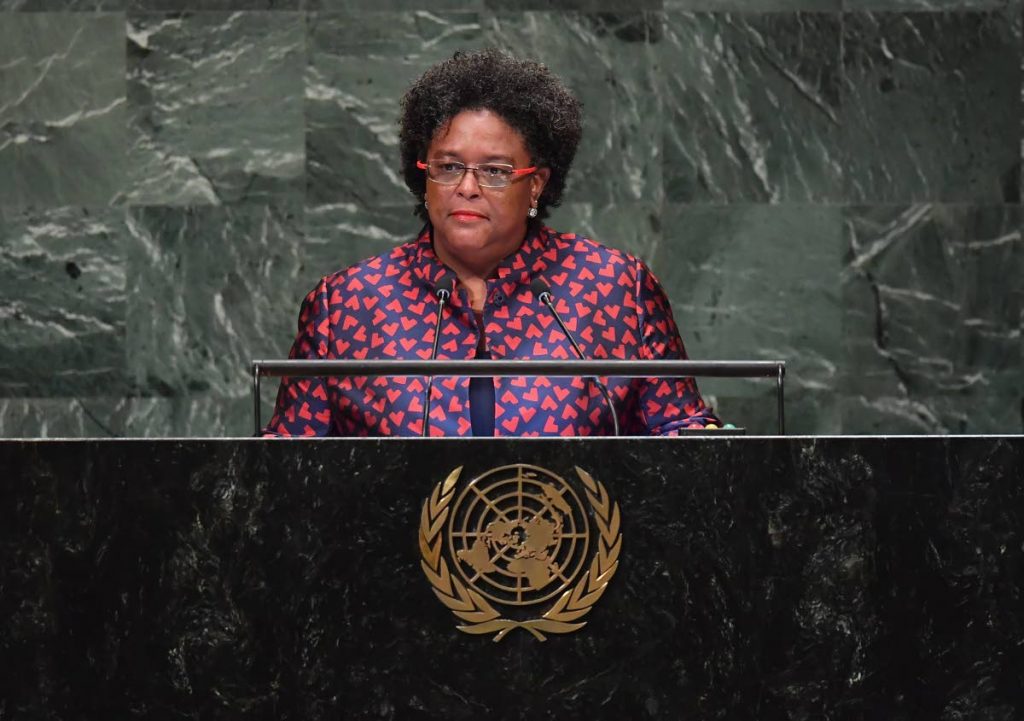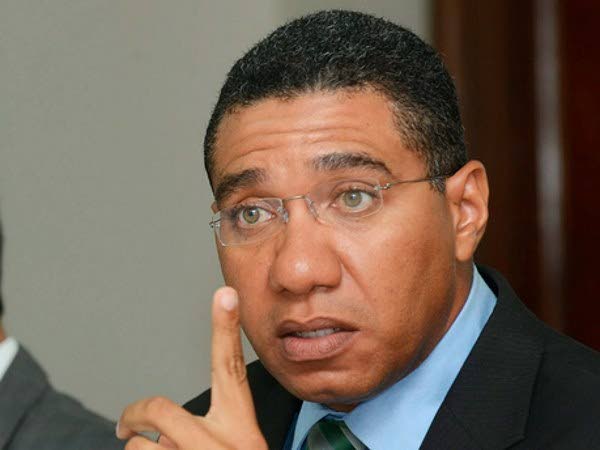CSME strong

The biggest sanction facing regional governments who may want to shirk responsibilities to the Caribbean Single Market Economy (CSME) is the poor performance of countries acting alone.
That, at least to Barbados Prime Minister Mia Mottley, would be the biggest impetus for member countries to support the goals of the single market economy to propel the goals of freedom of movement for people, goods, information and capital. As proof, Mottley cited the predicted economic contraction of the United Kingdom after a Brexit plan is implemented and the country withdraws from the European Union.
Mottley, chair of the CSME for the next three years, briefed the media on Tuesday evening at the Hilton, St Ann’s after a marathon meeting among regional leaders to hammer out an implementation plan and timeline to achieve CSME goals – culminating in 2021 with the free movement of people within the region.
“We are always stronger working together. The real truth of the Caribbean is that it is underpopulated compared to other regions in the world, so our problem is how best to boost population, boost growth and do so by allowing our people to move around such that where the skills are needed, they can be provided first and foremost by our people,” Mottley said.
Artificial barriers have been added to ocean distances, she said, and while that physical impediment can’t be changed, the artificial ones can. “We have to act in the singular interest of our nations and community,” she said.
The two-day meeting on CSME was spurred by the findings of a report prepared by former Jamaican prime minister Bruce Golding, at the behest of current PM Andrew Holness, which suggested that if that country could not find significant benefit from CSME membership within the next five years, Caricom's second biggest economy would consider pulling out – the region’s very own “Jexit.”

Holness presented the report, first to his parliament, which approved ten of the 33 findings, and then to a Caricom Heads of Government meeting in Montego Bay, Jamaica in January. TT Prime Minister, Dr Keith Rowley, finding the possibility of Jexit too critical and urgent for the region, and five years too long to deal with it, suggested this past week’s special meeting, hosted by him, and with one specific purpose–to discuss the future of CSME.
“Many people are concerned about the impact of climate. We have too many climate refugees within the region. Then there is the unfortunate determination of the Organisation for Economic Co-Operation and Development (OECD) and EU that threatens to destabilise many governments in the region (with tax compliance and possible de-risking) in terms of stability of revenue. (There’s also) the uncertainty of trade wars and rise of nationalism in the world today. Against that background we have to create stability and predictability for our citizens,” Mottley said.
As chair, she wasted no time working out a plan of action, including partnership with the private sector and labour, making them associate members of Caricom and allowing them to sit at the table during meetings. Parties have also established four main sectors to target for development – renewable energy, agriculture and food security, information and communication technology and maritime and air transport.
Key to that is unlocking and empowering not just the human capital of the region but, well, actual capital. “We have US$47 billion in savings within the community. We need to find a way to unlock that so our businesses and governments can have access to affordable capital to borrow at affordable rates, as well as giving better returns,” she said.
CSME has also appointed Barbados-born businessman Prof Avinash Persaud to head the restructured commission on the economy to advise on a regional growth agenda. There’s also going to be a working group on how to best create a sustained flow of information to the people within the CSME, so they can keep abreast of what’s happening in other member states, and hopefully make more informed decisions.
The region is also trying to streamline the freedom of movement of capital with policies that will facilitate the ease of doing business.
Among these will be model legislation for securities markets, as well as for trademarks and harmonisation of business names, hopefully completed by July.
There will also be mutual recognition for companies, so if a business is registered in one CSME territory it will be recognised in all. This will also apply for CSME skills certificates.
Several governments also signed on to the Multilateral Air Services Agreement which will hopefully be operationalised next February.
Mottley said Caricom will have “substantive discussion” between now and July to formulate tangible plans for the four key sectors.
“The people who need to benefit from these things are the ordinary Caricom people,” Mottley said.
Helping ordinary people includes standardising certification among countries to make exports and marketing easier.
A year from now, Caricom also hopes to simplify the administrative process for freedom of movement for goods via the Council for Trade and Economic Development.
Mottley also suggested a regional deposit insurance system and regional credit information sharing.
“Regional credit information sharing is critical because too many of our citizens want to borrow money and very often are denied access to lending institutions because they do not have a credit history,” she said.
By the end of next year, there will be a single window for companies’ registration that will go beyond regional recognition, and by 2021, a single window for intellectual property registration.
True regional integration will culminate by 2021 with full freedom of movement for all Caribbean people in the community for those who want it, Mottley said.
“These meetings were very productive. We have laid out a roadmap for how the Caribbean will be able to move, invest, and have hassle free options in terms of how to conduct business. (We have a) determination to unlock the capital of the region. It’s up to us to make this region better,” she said.
CSME goals
* Freedom of movement people, goods, information, capital
Targets
* renewable energy
* agriculture and food security
* information and communication technology
* maritime and air transport.


Comments
"CSME strong"